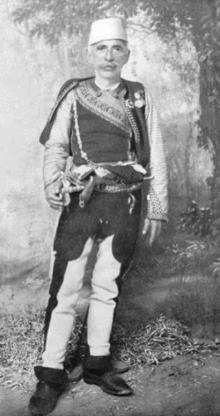Ded Gjo Luli
| Dedë Gjo Luli | |
|---|---|
 Photo of Ded Gjo Luli | |
| Born |
1840 Trabojin, Sanjak of Scutari, Ottoman Empire (now in Podgorica, Montenegro) |
| Died |
24 September 1915 Orosh (in modern Mirditë District, Albania) |
| Nationality | Albanian |
| Known for | Commander of the 1911 revolt |
| Religion | Roman Catholicism |
Ded Gjo Luli (1840–1915), was an Albanian nationalist figure and guerrilla leader most notable for commanding the 1911 revolt against Ottoman troops. He was posthumously awarded the "Hero of Albania".
Early life
Luli was born in the village of Trabojin, at the time part of the Sanjak of Scutari of the Ottoman Empire (now in Podgorica, Montenegro). He belonged to the Dedvukaj family (or brotherhood[1]) of the Hoti tribe.[2] In the late Ottoman period, Hoti was regarded the foremost bajrak of the Malësia e Madhe region.[3]
League of Prizren
A member of the League of Prizren, Luli participated in the conflicts in Plav and Gusinje (1879–80)[2] that resisted the decision of the Congress of Berlin (June–July 1878) to cede Ottoman territories to the Principality of Montenegro (as part of ending the Great Eastern Crisis). As the cession of Plav and Gusinje was proven impossible without bloodbath, the Ottoman Empire ceded Ulcinj in January 1880 as compensation.
Albanian rebellion
By the beginning of 1911, Roman Catholic Albanians were disturbed by the Ottoman situation in the Balkans.[4] Montenegring king Nikola Petrović encouraged the northern Albanian tribes (Malissori) to revolt against the Ottoman Empire.[4] After having led a premature rebellion in the mountains north of Scutari in late March 1911, succeeding in capturing Tuzi, Luli was compelled by King Nikola to rally the Malissori in April.[5] Albanian rebels[6] and refugees from the Kosovo Vilayet had been given refuge in Montenegro.[7] General Vukotić himself passed out weapons to them, despite the fact that Montenegro was officially neutral.[6] Rebels were returned across the frontier, and some 8,000 men, with Montenegrin supply of arms, ammunition and advice, fought against Ottoman divisions, defeating the large contigent of Shefket Turgut Pasha several times.[8] After the victory at Deçiq, an Albanian flag was symbolically raised on the Bratile mountain for the first time in several centuries since Ottoman occupation.[9] Despite aiding the rebels, Nikola's strategy was to spark unrest in northern Albania and north-western Kosovo so that he could intervene and expand his borders.[10]
Legacy
Ded is most known for starting the revolution for the Albanians, which eventually led to later actions by Luigj Gurakuqi, Ismail Qemali, and Isa Boletini.
In Tirana, Albania's capital city, there is a street named in his honor called "Rruga Ded Gjo Luli". In the village of Bardhaj in Hot, the rubble of his house, that was left in ruins after the war, was converted into a museum which represents his life as a hero to the Albanian people.
An epic poem on his 1910–11 fight against the Ottomans was recorded by Gjergj Fishta.[11]
Annotations
- Robert Elsie spells his name Dedë Gjo' Luli.[2]
References
- ↑ Jovićević 1923, p. 153.
- 1 2 3 Elsie 2015, p. 57.
- ↑ Elsie 2015, pp. 55–56.
- 1 2 Pearson 2005, p. 13.
- ↑ Pearson 2005, pp. 13–14.
- 1 2 Treadway 1983, p. 75
- ↑ Vickers 1999, p. 63.
- ↑ Pearson 2005, p. 14.
- ↑ Nikprelaj, Gjergj (5 January 2006). "DEDE GJO LULI, MBROJTESI FISNIK I TROJEVE SHQIPTARE". Koha Jone (in Albanian). Koco Kokedhima. Retrieved 20 September 2010.
- ↑ Malcolm, Noel (1998). Kosovo: A short history. Washington Square, New York: New York University Press. p. 242. ISBN 0-8147-5598-4.
- ↑ Gjergj Fishta; Robert Elsie; Janice Mathie-Heck (2005). The Highland Lute. I.B.Tauris. pp. 364–. ISBN 978-1-84511-118-2.
Further reading
- Pearson, Owen (2005). Albania in the Twentieth Century, A History: Volume I: Albania and King Zog, 1908-39. I.B.Tauris. ISBN 9781845110130.
- Treadway, John D (1983), "The Malissori Uprising of 1911", The Falcon and Eagle: Montenegro and Austria-Hungary, 1908-1914, West Lafayette, Ind.: Purdue University Press, ISBN 978-0-911198-65-2, OCLC 9299144, retrieved October 10, 2011
- Vickers, Miranda (1999). The Albanians: a modern history. I.B.Tauris. ISBN 978-1-86064-541-9.
- Richard C. Hall (9 October 2014). War in the Balkans: An Encyclopedic History from the Fall of the Ottoman Empire to the Breakup of Yugoslavia. ABC-CLIO. pp. 10–. ISBN 978-1-61069-031-7.
- Jovićević, Andrija (1923), "Malesija", Насеља и пореклo становништва, Akademija